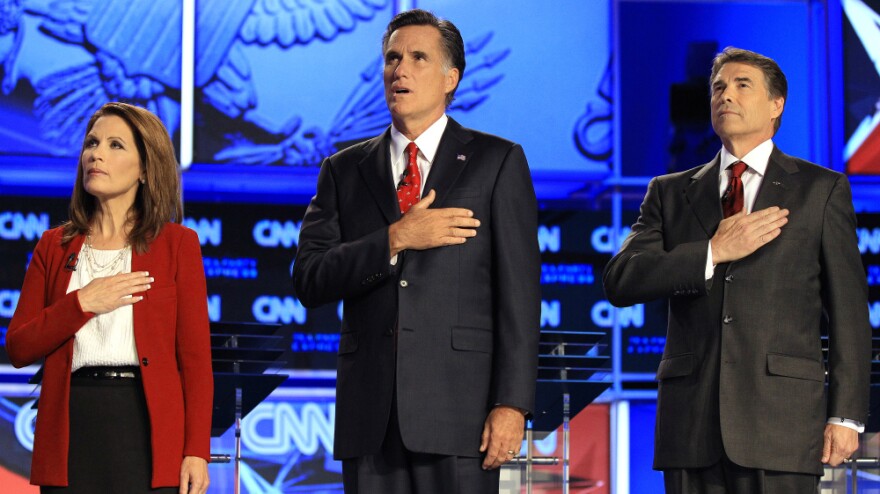Wherever he goes, GOP presidential candidate Rick Perry proudly waves the flag of conservatism, often introducing himself with, "I simply want to get America working again and make Washington, D.C., as inconsequential in your life as I can."
But the Texas governor, a favorite of conservatives overall, is taking criticism for being too moderate when it comes to immigration. The reason: In 2001, his first full year in office, he signed legislation that grants in-state tuition rates at Texas colleges and universities to some illegal immigrants.
He was forced to defend that move at last week's CNN/Tea Party-sponsored debate in Tampa.
"If you are working and pursuing citizenship in the state of Texas, you pay in-state tuition there. And the bottom line is it doesn't make any difference what the sound of your last name is," he said. "That is the American way."
Perry's answer prompted boos from Tea Party activists in the audience.
Opponents On The Offensive
Minnesota Rep. Michele Bachmann compared Perry's Texas immigration policy to the federal DREAM Act, which is supported by the White House. That proposal would provide a path to legal U.S. residency for people who arrived in the U.S. illegally as minors and who meet certain conditions.
And there was this from former Pennsylvania Sen. Rick Santorum: "What Gov. Perry's done is he provided in-state tuition for illegal immigrants. Maybe that was an attempt to attract the illegal vote — I mean, the Latino voters."
Former Massachusetts Gov. Mitt Romney, considered the moderate among the top-tier GOP contenders, has also joined the attack.
While Perry does call for a much stronger federal presence patrolling the U.S.-Mexico border, he opposes building a wall. Romney calls for a high-tech fence to be built, and he says, "As governor, I vetoed legislation that would have provided in-state tuition breaks to illegal immigrants, and I strengthened the authority of our state troopers to enforce existing immigration laws."
Focus On Latino Voters
Perry's outreach to Latinos includes a meeting behind closed doors with Hispanic business leaders Monday in New York City.
Among Latino voters, Democrats enjoy a tremendous edge. Mindful of that, the independent group American Crossroads, founded by former George W. Bush adviser Karl Rove, has run Spanish-language ads that keep the focus solely on President Obama and the economy.
The message is about the impact the bad economy and the president's policies have had on Latino families.
Such ads are a recognition that tough talk on immigration now can hurt the GOP nominee come the general election. But Matt Barreto, a Latino political analyst at the University of Washington, says even a focused economic message is still a very tough sell for Republicans with this group of voters.
"When we ask in our polling ... we find consistently that Latino voters tell us that they trust Obama and the Democrats at much higher rates, almost 3-1, than they do Republicans on fixing the economy," he says. "When we go back to the Bush tax cuts, which President Obama extended, we found that Latino voters were opposed to that. They said they should have let them expire."
But Roberto Suro of the Annenberg School at the University of Southern California says the GOP goal is to discourage Latino voters who once supported Obama. He says they may not vote Republican, but you might get them to stay home.
"If you can move a fairly small percentage of Latino voters in the right places, you can have a big difference in the electoral college outcomes," Suro says.
Look at New Mexico, Colorado and Nevada, he says — all states that Obama carried in 2008, but also places where President Bush won four years earlier. Each has a big Latino population.
If Obama's total among those voters falls off significantly, that could be the difference between winning re-election or not.
Copyright 2021 NPR. To see more, visit https://www.npr.org.



